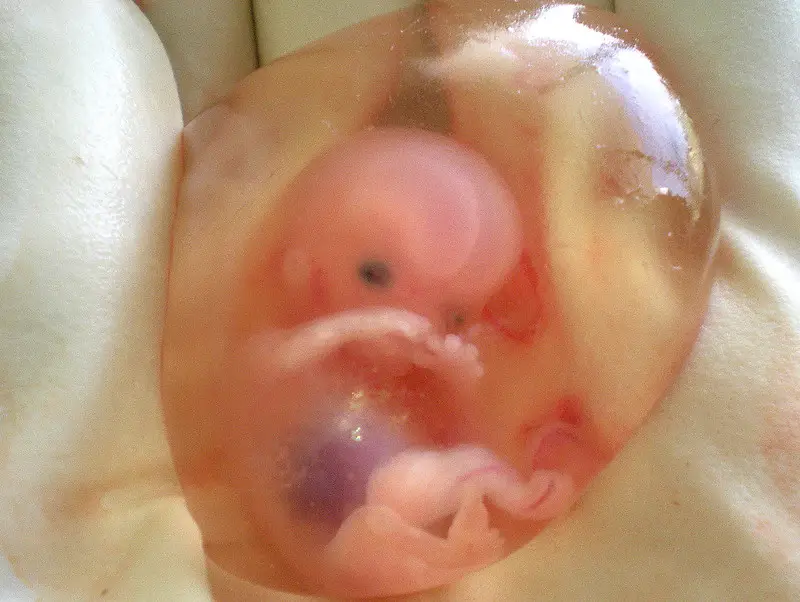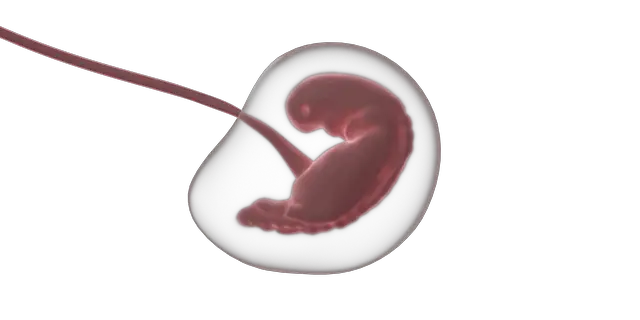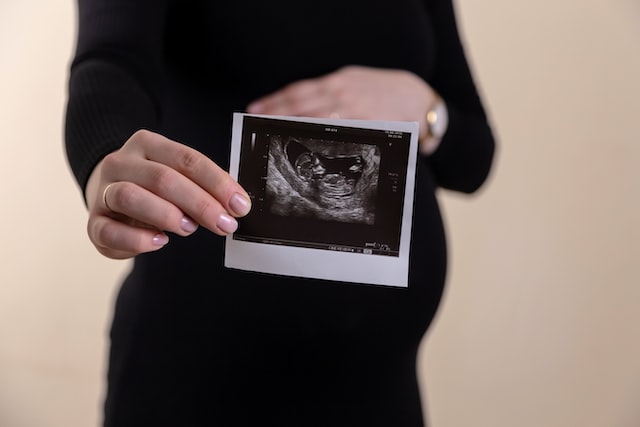An embryo is the term used to describe the developing organism from the time of fertilization until the end of the eighth week of pregnancy. A fetus is the term used to describe the developing organism from the ninth week of pregnancy until birth. In other words, the terms embryo and fetus refer to the same organism, but at different stages of development.
What is a fetus?
(Photo By suparna sinha on Flickr)

A fetus is the stage of human development immediately following the embryonic stage. The fetus is typically defined as a developing human from the end of the eighth week after fertilization (when the major structures of the body have formed) until birth.
What is an embryo?
(Image by Weslley Carvalho de Souza Weslleycs97 from Pixabay )

An embryo is the developing offspring during the earliest stage of pregnancy. In humans, this period lasts until about eight weeks after fertilization of the egg by the sperm. After this point, the developing human is called a fetus.
What comes before embryo?
Before an embryo can form, there must be a fertilized egg. This occurs when a sperm cell meets and fertilizes an egg cell. Once the egg is fertilized, it begins to divide into cells and becomes an embryo.
What are the two main types of development for offspring?
Internal fertilization and External fertilization .
Internal fertilization is when conception and development of the embryo occurs inside the female’s body.
External fertilization is when conception and initial development occur outside of the mother’s body, as in certain fish and amphibians. For mammals, however, internal fertilization is the rule.
The fertilized egg cell, or zygote, contains all of the information necessary to form an entire organism. This information is in the form of DNA molecules. The zygote rapidly divides into smaller cells, each with its own complete set of DNA molecules. One complete set comes from the mother and one from the father. The term “fetus” generally refers to later stages of prenatal development when major structures have begun to form. “Embryo” generally refers to earlier stages of prenatal development before major structures have formed.
Is foetus and embryo same?
Embryo refers to the stage of development prior to eight weeks after fertilization. At this point in time, the developing individual is called a fetus. The main distinction between these two terms is that an embryo is less developed than a fetus. A fetus has developed more extensively and is therefore further along in development than an embryo.
When is an embryo called a fetus?
An embryo is typically referred to as a fetus starting around the ninth week of pregnancy. Before the ninth week, the developing organism is called an embryo.
It’s worth noting that the exact timing of when an embryo becomes a fetus can vary slightly depending on the source, but generally, it’s considered a fetus from the ninth week of pregnancy onwards.
Does a fetus have a heartbeat?
A fetus is a stage of prenatal development that follows the embryonic stage. Fetal development begins after the 10th week of gestation and lasts until birth. During this time, the developing baby grows from about the size of a kidney bean to about 20 inches long. The most significant change during this time is the growth and development of the brain, nervous system, and organs. By the end of the first trimester, all major organ systems are present and functioning.
During fetal development, there are many changes that occur in order to prepare the fetus for life outside of the womb. One of these changes is the development of a heartbeat. The heart starts beating around 21 days after conception, but it is not until about week 6 or 7 of gestation that it can be detected by ultrasound. A normal fetal heart rate is between 110 and 160 beats per minute.
The presence of a heartbeat is one indicator that fetal development is progressing as it should. If you are pregnant and have concerns about your baby’s heartbeat, be sure to discuss them with your healthcare provider.
Does a fetus have a brain?
Yes, a fetus has a brain. The brain starts developing during the third week of pregnancy and is fully developed by the end of the fourth month.
What is the last organ to develop in a fetus?
The last organ to develop in a fetus is the brain. This is because the brain needs time to grow and develop. The brain is the most important organ in the body, and it controls all of the other organs.
When does the heart start beating?
The heart starts beating around 21 days after conception.
Is A embryo a baby?
When it comes to discussing pregnancies, you will often hear the terms “fetus” and “embryo” used interchangeably. While it is true that both refer to the developing baby inside the mother’s womb, there is actually a big difference between the two terms. An embryo is the very early stage of human development, typically referring to the first eight weeks after fertilization when major body systems are just beginning to form. During this time, the embryo is very fragile and can easily be damaged. A fetus, on the other hand, is the stage of development that occurs from week nine until birth. At this point, the baby has developed all its major organs and systems and is much more resistant to harm.
What are the first 2 organs to develop in a fetus?
The first two organs to develop in a fetus are the brain and the heart. The brain starts to develop within the first few weeks of pregnancy, and the heart begins to form shortly thereafter. As the brain and heart continue to develop, they begin to control the other organs and systems of the body. By the end of the first trimester, most of the major organs and systems of the body have begun to develop, though they are not yet fully functional.
How big is a 3 month old fetus?
At three months old, a fetus is about the size of a grapefruit. They weigh around one ounce and are approximately three inches long. Most of their vital organs are developed, including their heart, lungs, stomach, intestines, and kidneys. However, they are still very fragile and need to continue to grow and develop in order to survive outside of the womb.
How can we conceive twins?
There are two main ways that twins can be conceived. The first is when two separate eggs are fertilized by two different sperm cells. This is known as dizygotic, or fraternal, twins. The second way is when a single egg is fertilized by a single sperm cell, but then splits into two embryos. This is known as monozygotic, or identical, twins.
Dizygotic twins occur when a woman releases two eggs during ovulation and both are fertilized. This type of twinning happens randomly and is not influenced by genes or anything the parents do. Dizygotic twins only share about 50% of their genetic material with each other since they come from two separate eggs. Fraternal twins may or may not be the same sex, and they often look very similar to each other but are no more alike than any other siblings.
Monozygotic twins form when a single egg is fertilized by a single sperm cell and then splits into two embryos sometime before implantation in the uterus. This type of twinning is determined entirely by genes and there is nothing the parents can do to influence it. Monozygotic twins share 100% of their genetic material with each other and are always the same sex. Identical twins often look very much alike but they are not truly identical because they develop in different uterine environments and may experience different prenatal influences.
Can I get pregnant while pregnant?
As you may have guessed, it is possible to get pregnant while already pregnant. This is called superfetation and can happen when a woman releases more than one egg during her ovulation cycle. When this happens, fertilization of the second egg can take place while the first egg is still implant in the uterus. While this is a rare occurrence, it can happen and does pose some risks to both the mother and the babies.
Are zygote and foetus same?
Zygote and foetus are not the same. A zygote is a single cell that results from the union of an egg and a sperm during fertilization. The zygote contains all the necessary genetic information to direct its own development into an embryo. A foetus is an unborn baby that has completed at least eight weeks of development. The foetus is contained within the mother’s uterus, where it will continue to grow until birth.
Is a human embryo alive?
A human embryo is a living organism. It is composed of cells that are actively dividing and growing. A human embryo has the ability to develop into a baby, and it is this potential that makes it alive.
When you think about it, all life starts as an embryo. Every animal start out as a tiny embryo before growing into an adult. Human embryos are no different. In fact, they are very similar to other animal embryos.
One big difference between human embryos and other animals is that human embryos are protected by law. This means that they have certain rights and cannot be harmed or destroyed without proper justification.
Do human embryos have brains?
This is a difficult question to answer, as there is much debate surrounding the definition of “brain.” Some people believe that the brain begins developing once the neural tube forms, which typically happens between days 16 and 28 after fertilization. Others believe that the brain doesn’t begin developing until later in pregnancy, when the cerebral cortex starts to form.
There is no right or wrong answer to this question, as it ultimately comes down to personal beliefs. However, it is important to remember that even if an embryo does not have a fully developed brain, they are still human beings deserving of respect and dignity.
Is sperm good for the baby during pregnancy?
Most people believe that sperm is good for the baby during pregnancy, but there is actually no scientific evidence to support this claim. However, some experts believe that sperm may help to promote the development of the fetus by providing essential nutrients and hormones.
Featured Image By – Photo by Volodymyr Hryshchenko on Unsplash








